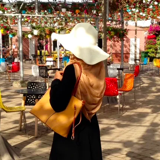“They said, “O Moses, either you throw [your staff], or we will be the ones to throw first. He said, “You throw…” [7: 115]
I’ve always been intrigued at this… every time the standoff between Musa and the magicians is mentioned, this particular dialogue comes up. ‘Will you make the first move, or shall we?’ And each time, Musa gives them the go ahead…
It’s always wiser to give people the time and space to talk; let them get things off their chest. If they are a friend, relative, or an upset spouse, you listen and try to understand where they’re coming from. If they are an opponent like in the case of Musa’s, you let them showcase all they have, learn their argument, and see their tools & tricks – then you can top it.
It’s a wonder why the Qur’an repeats this dialogue between Musa and the sorcerers, but on the other hand, it’s no wonder because the listening ear has always held the stronger position. When you listen and observe, you’re gifted with the opportunity to absorb. So when it is your time to finally speak, you get to speak from a position of strength, a place of understanding, and of knowing your disputant or associate very well.
It reminds me of when ‘Utbah ibn Rabi’ came to the Prophet (sallallahu `alayhi wa sallam) to argue with him, and instead of the heated discussion that could’ve been, the Prophet gave him space to air himself; he let him have the first throw, and when he was done the Prophet (s) said, ‘Now listen to me.’ And he simply recited Surah Fussilat. At the end of it, ‘Utbah walked away as a changed man due to the Qur’an affecting his heart. So when people come to you, let them throw. Always let them throw first.
Subscribe for Updates
Original content used with permission from:






